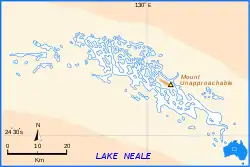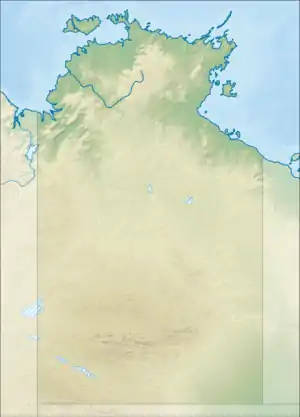Lake Neale
Lake Neale (together with Lake Amadeus, Pitjantjatjara: Pantu[2] ("salt lakes")) is a salt lake in the southwest corner of the Northern Territory of Australia. It is on the north-western side of Lake Amadeus. The two lakes form part of a chain of salt lakes that stretches about 500 km (310 mi), from Lake Hopkins in the west to the Finke River in the east.[3] This drainage basin is known as the Amadeus Basin.[4] The lake is usually a dry salt pan, and only holds water for short periods after heavy rainfall. Lake Neale is on Aboriginal land, held in the Petermann Aboriginal Land Trust. The Haasts Bluff lands are nearby to the north.[5]
| Lake Neale (Pantu) | |
|---|---|
 | |
 Lake Neale (Pantu) | |
| Location | Petermann. Northern Territory[1] |
| Coordinates | 24°15′00″S 129°52′00″E[1] |
| Type | Salt lake |
| Basin countries | Australia |
| Max. length | 64 km (40 mi) |
| Surface area | 300 km2 (120 sq mi) |
| Surface elevation | 457 m (1,499 ft) |
Description
Lake Neale was named after Frank Neale, one of the pilots of an aerial expedition to accurately survey the desert regions northwest of Alice Springs in 1930. Neale flew one of the two planes that had been hired by explorer Donald Mackay for the expedition. The team made 15 survey flights over 24 days, in which they mapped the dimensions of Lakes Amadeus and Neale and found the even larger Lake Mackay, further to the north.[6][7]
The first European to see Lake Neale was the explorer Ernest Giles in 1872. He was travelling towards Kata Tjuta after sighting the peak from a distance, but Lake Amadeus blocked his path.[8] He sighted Lake Neale when he tried to reach Mount Unapproachable, on the northern side of the lake. He was coming from the east, and did not notice a land bridge between Neale and Amadeus, mistaking them as the one lake. William Tietkens corrected this mistake in an expedition of his own seventeen years later.[9]
References
- "Search results for 'Lake Neale'". NT Place Names Register. Northern Territory Government. Retrieved 20 January 2020.
- "Ngura Nganampa Kunpu Kanyinma Keep on Looking After Our Country Strongly" (PDF). Retrieved 14 October 2020.
- A. J. McComb, P. S. Lake (1988). The Conservation of Australian wetlands. World Wildlife Fund Australia. p. 113. ISBN 9780949324139.
- Michael Lazarides (1970). The grasses of Central Australia. Australian National University Press. p. xvi.
- "Lake Amadeus and Lake Neale" (PDF). Sites of conservation significance. Government of the Northern Territory, Department of Natural Resources, Environment, the Arts and Sport. p. 175. Archived from the original (PDF) on 18 May 2013. Retrieved 30 March 2013.
- David Corke (22 March 2010). "Aviation: The adventures of Love Bird and Diamond Bird". Australian Geographic. Archived from the original on 22 September 2012. Retrieved 13 June 2013.
- Keith Raymond Meggs (2009). Australian-built aircraft and the industry. 1. p. 198.
- Jenny Stanton (2000). The Australian Geographic Book of the Red Centre. Australian Geographic. Terrey Hills, New South Wales. p. 44. ISBN 1862760136.
- Erwin Herman Josef Feeken, Gerda Elisabeth Emma Feeken (1970). The discovery and exploration of Australia. Thomas Nelson. p. 191.
